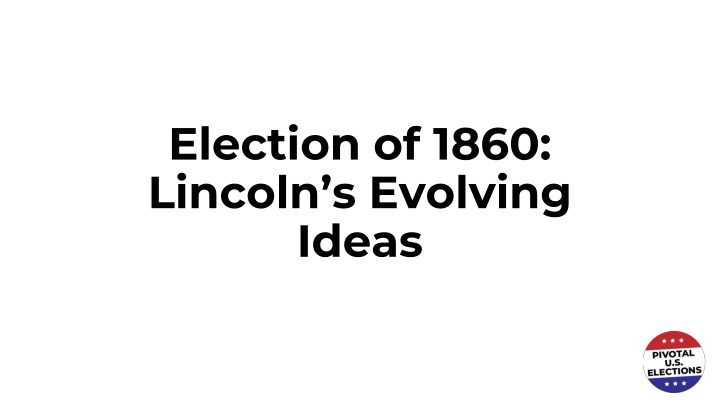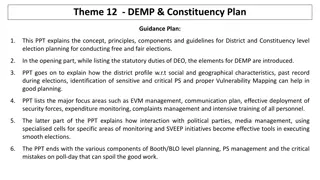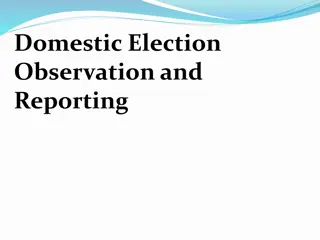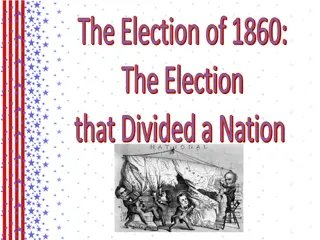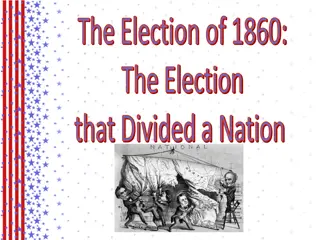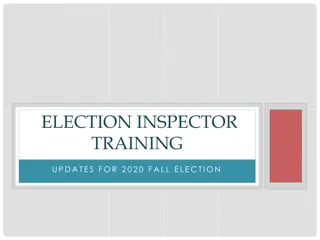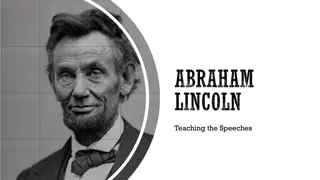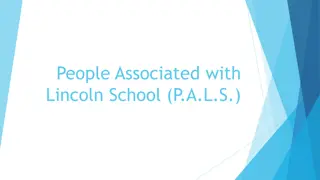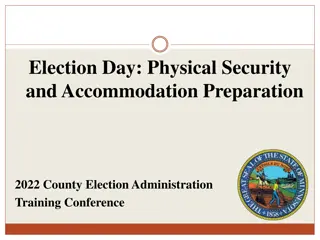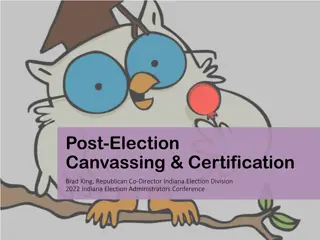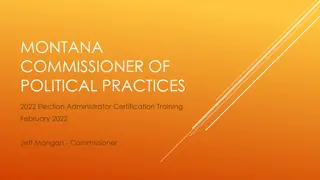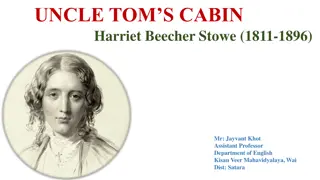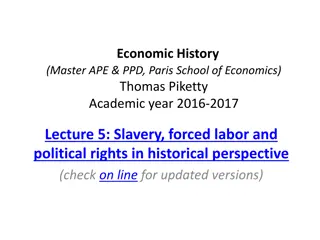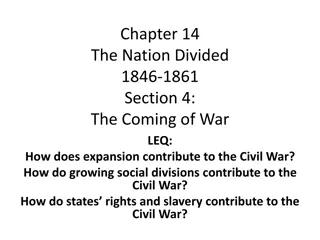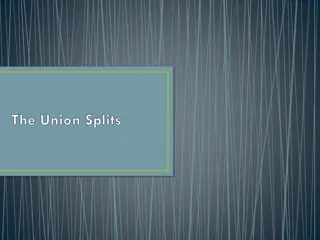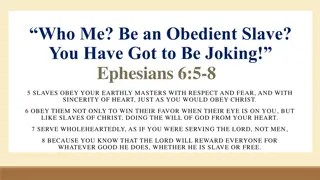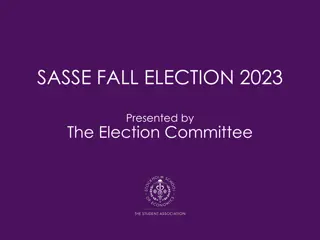Election of 1860: Lincoln's Changing Views on Slavery and Federal Authority
The election of 1860 marked a turning point, leading to secession of states and the start of the Civil War. Abraham Lincoln initially pursued a moderate stance on slavery to keep states in the Union. His evolving ideas on liberty, equality, and government are reflected in his speeches. The outcome showed Lincoln's victory over Breckinridge, Bell, and Douglas. An excerpt from "A Prayer for Twenty Millions" reflects discontent with Lincoln's approach to Rebel slavery.
Download Presentation

Please find below an Image/Link to download the presentation.
The content on the website is provided AS IS for your information and personal use only. It may not be sold, licensed, or shared on other websites without obtaining consent from the author.If you encounter any issues during the download, it is possible that the publisher has removed the file from their server.
You are allowed to download the files provided on this website for personal or commercial use, subject to the condition that they are used lawfully. All files are the property of their respective owners.
The content on the website is provided AS IS for your information and personal use only. It may not be sold, licensed, or shared on other websites without obtaining consent from the author.
E N D
Presentation Transcript
Election of 1860: Lincoln s Evolving Ideas
Essential Question How did Abraham Lincoln s views about slavery and the balance of state and federal authority change following the election of 1860?
Key Ideas The election of a Republican candidate in 1860 represented a point of no return for many people in slaveholding states who feared an end of slavery. While sectional and political differences had been a part of nearly every prior election, these differences proved irreconcilable in 1860. Seven states seceded from the Union within three months of the election and four more seceded in the months to follow. With the Civil War, the United States began the process of resolving two questions that had persisted since the framing of the Constitution: What was the relationship between federal and state authority? Where did the authority to limit the expansion of slavery lie?
Key Ideas Because he hoped to keep as many states in the Union as possible, Lincoln initially pursued a moderate course regarding abolition, trying not to alienate the slaveholding states which had not seceded: Kentucky, Missouri, Maryland, and Delaware. Lincoln s own views about liberty, equality, union, and government are reflected in the speeches he made throughout his presidency.
Candidates and Outcome Lincoln 180 Breckinridge 72 Bell 39 Douglas 12 Abraham Lincoln (Republican) Stephen Douglas (Democrat, northern) John Breckinridge (Democrat, southern) John Bell (Constitutional Union)
Warm-Up Excerpt from "A Prayer for Twenty Millions," Horace Greeley, New York Tribune, August 20, 1862 Letter, Abraham Lincoln to Horace Greeley, August 22, 1862
Excerpt from "A Prayer for Twenty Millions" Horace Greeley, New York Tribune August 20, 1862 To ABRAHAM LINCOLN, President of the United States DEAR SIR: I do not intrude to tell you--for you must know already--that a great proportion of those who triumphed in you election, and of all who desire the unqualified suppression of the Rebellion now desolating our country, are sorely disappointed and deeply pained by the policy you seem to be pursuing with regard to the slaves of the Rebels. . V. We complain that the Union cause has suffered, and is now suffering immensely, from mistaken deference to Rebel Slavery. Had you, Sir, in your Inaugural Address, unmistakably given notice that, in case the Rebellion already commenced were persisted in, and your efforts to preserve the Union and enforce the laws should be resisted by armed force, you would recognize no loyal person as rightfully held in Slavery by a traitor, we believe the Rebellion would therein have received a staggering if not fatal blow. . Greeley, Horace. "A Prayer for Twenty Millions", New York Tribune. August 20, 1862. From American Antiquarian. https://www.americanantiquarian.org/Manuscripts/greeley.html.
Excerpt from "A Prayer for Twenty Millions" Horace Greeley, New York Tribune August 20, 1862 VIII. On the face of this wide earth, Mr. President, there is not one disinterested, determined, intelligent champion of the Union cause who does not feel that all attempts to put down the Rebellion and at the same time uphold its inciting cause are preposterous and futile--that the Rebellion, if crushed out tomorrow, would be renewed within a year if Slavery were left in full vigor--that Army officers who remain to this day devoted to Slavery can at best be but half-way loyal to the Union--and that every hour of deference to Slavery is an hour of added and deepened peril to the Union, I appeal to the testimony of your Ambassadors in Europe. It is freely at your service, not at mine. Ask them to tell you candidly whether the seeming subserviency of your policy to the slaveholding, slavery-upholding interest, is not the perplexity, the despair of statesmen of all parties, and be admonished by the general answer. IX. I close as I began with the statement that what an immense majority of the Loyal Millions of your countrymen require of you is a frank, declared, unqualified, ungrudging execution of the laws of the land Yours, Horace Greeley New York, August 19, 1862 Greeley, Horace. "A Prayer for Twenty Millions", New York Tribune. August 20, 1862. From American Antiquarian. https://www.americanantiquarian.org/Manuscripts/greeley.html.
Letter, Abraham Lincoln to Horace Greeley Abraham Lincoln August 22, 1862 Executive Mansion Washington, August 22, 1862 Hon. Horace Greeley: Dear Sir I have just read yours of the 19th. addressed to myself through the New-York Tribune. If there be in it any statements, or assumptions of fact, which I may know to be erroneous, I do not, now and here, controvert them. If there be in it any inferences which I may believe to be falsely drawn, I do not now and here, argue against them. If there be perceptable in it an impatient and dictatorial tone, I waive it in deference to an old friend, whose heart I have always supposed to be right. As to the policy I seem to be pursuing as you say, I have not meant to leave any one in doubt. Lincoln, Abraham. Letter to Horace Greeley, August 22, 1862. In Collected Works of Abraham Lincoln, edited by Roy P. Basler, 5: 388-389. New Brunswick, NJ: Rutgers University Press, 1953. From Abraham Lincoln Online. http://www.abrahamlincolnonline.org/lincoln/speeches/greeley.htm.
Letter, Abraham Lincoln to Horace Greeley Abraham Lincoln August 22, 1862 I would save the Union. I would save it the shortest way under the Constitution. The sooner the national authority can be restored; the nearer the Union will be the Union as it was. If there be those who would not save the Union, unless they could at the same time save slavery, I do not agree with them. If there be those who would not save the Union unless they could at the same time destroy slavery, I do not agree with them. My paramount object in this struggle is to save the Union, and is not either to save or to destroy slavery. If I could save the Union without freeing any slave I would do it, and if I could save it by freeing all the slaves I would do it; and if I could save it by freeing some and leaving others alone I would also do that. What I do about slavery, and the colored race, I do because I believe it helps to save the Union; and what I forbear, I forbear because I do not believe it would help to save the Union. I shall do less whenever I shall believe what I am doing hurts the cause, and I shall do more whenever I shall believe doing more will help the cause. I shall try to correct errors when shown to be errors; and I shall adopt new views so fast as they shall appear to be true views. I have here stated my purpose according to my view of official duty; and I intend no modification of my oft-expressed personal wish that all men every where could be free. Yours, A. Lincoln. Lincoln, Abraham. Letter to Horace Greeley, August 22, 1862. In Collected Works of Abraham Lincoln, edited by Roy P. Basler, 5: 388-389. New Brunswick, NJ: Rutgers University Press, 1953. From Abraham Lincoln Online. http://www.abrahamlincolnonline.org/lincoln/speeches/greeley.htm.
